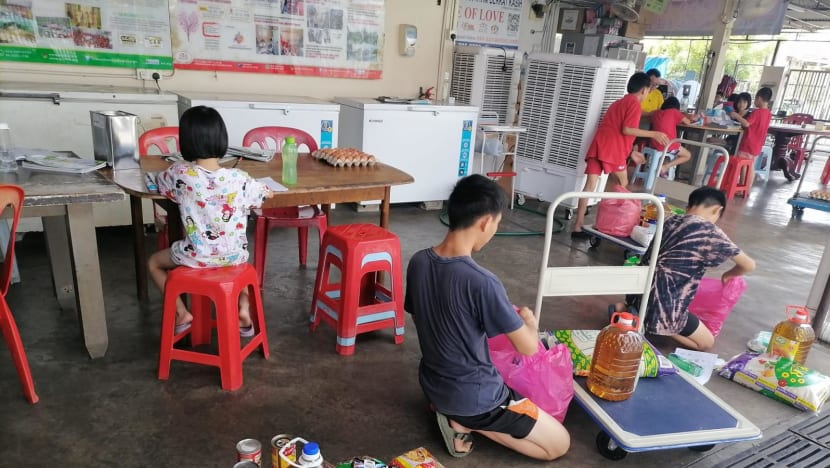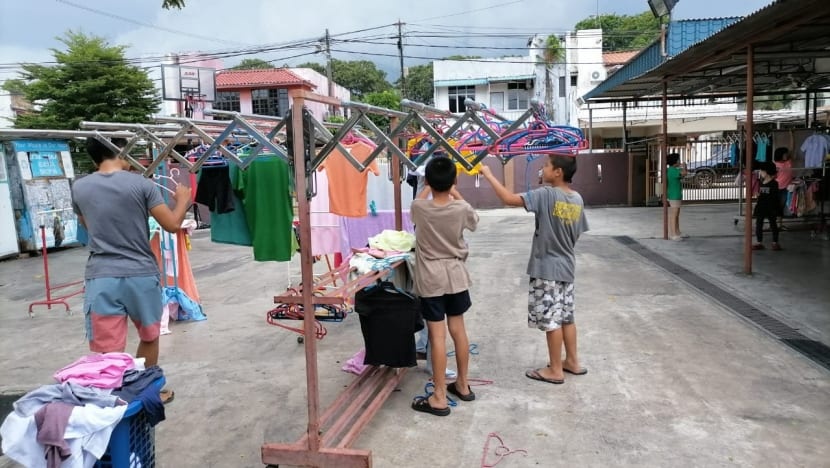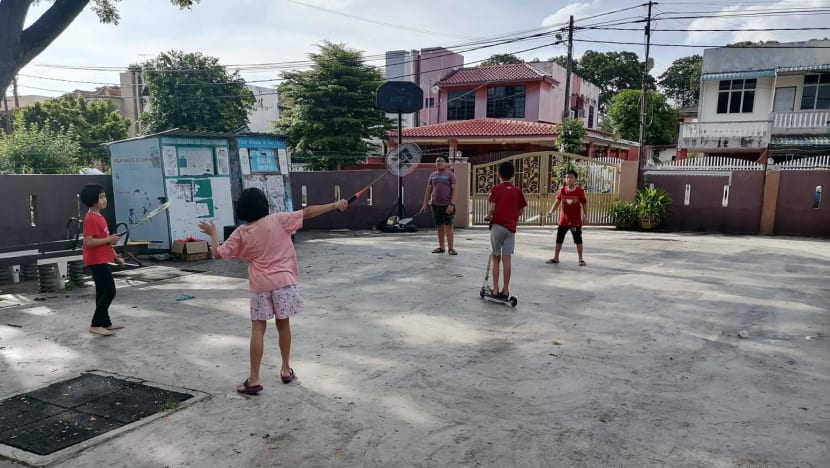‘Don’t make use of us’: Operators of children’s shelters in Malaysia lament some parents who leave kids behind
Children should grow up in familial settings as life in an institution could hamper their development and well-being, experts say.

The House of Love children's home in Klang currently has 29 kids in its care. (Photo: Facebook/福爱之家 Hol Love)

This audio is generated by an AI tool.
KUALA LUMPUR: The House of Love children’s home in Klang has cared for more than 100 kids since it opened more than a decade ago.
Many enter the home at a young age - usually below eight years old - and stay there for years, barely knowing their biological parents and without the kind of love and care only provided in familial settings.
About a decade ago, House of Love took in a three-year-old girl after her mother ran into some relationship problems and neglected the child. The mother has remarried four times. The girl, now 13, is still living in the children’s home.
“Five years ago, the mother moved to the UK, but she dumped her child in Malaysia,” House of Love founder and director Joseph Pang told CNA.
“We don’t charge any fees, but the way some people look at us is like we should help them because we get public support. It’s that kind of attitude. It’s really bad.”
Orphanages in Malaysia are seeing more children in their care - some by as much as 20 to 30 per cent - as parents, struggling with losing their jobs or spouse during the COVID-19 pandemic, feel they cannot afford to care for their kids, shelter operators and child experts said.
But these observers also question what they perceive as some troubled parents being too willing to send their kids to homes, calling it a “selfish” attitude that prioritises other needs over their own children.
They stressed that a child should always be given a chance to grow up in their own families and homes, citing how life in an institution could hamper their development and well-being.
Mdm Che Asmah Ibrahim, the former chief executive officer of OrphanCare - an organisation that promotes family-based care of children - told CNA that this readiness to commit children to a home has become a societal problem.
OrphanCare estimates there are 64,000 children living in childcare institutions in Malaysia, including in registered and unregistered government and private orphanages.
“I always advocate that no matter the problems between husband and wife, the welfare of their children must be a priority,” said Mdm Che Asmah.
“Nowadays, this parenting responsibility is increasingly being taken lightly. This contributes to the social problems that we are having today.”
MONEY NOT THE MAIN ISSUE
Back at House of Love, Dr Pang said the home currently cares for 29 children, a 30 per cent increase since last year.
Some of the new arrivals are due to financial problems, he said, where the father is out of the picture for reasons like drug addiction or incarceration, and the single mother has to work and is unable to support the child.
But a majority, Dr Pang said, is due to what he felt are parents who just do not seem keen on continuing to raise their child. This included those who remarry and neglect their child until they become spoilt or uncontrollable, then use this as a reason to send them away to homes.
“Money is one issue, but it is not the main issue. The main issue is that the world is sick now. Everybody is so selfish with no sense of responsibility,” he said.
Dr Pang believes that parents with the right attitude will not send their kids to a home and instead try their best no matter the difficulties, noting that charities like food banks stand ready to help needy families with the costs of raising children.
“But some parents (would) rather dump their children in a home so they can enjoy their alone time,” he said.

Parents who intend to send a child to House of Love are first interviewed to determine if they are really incapable of caring for the kid, said Dr Pang.
“If I sense an attitude problem (with the parents), I will tell them straight away that I won’t take in the child,” he said.
Sometimes, he urges parents to take back their children earlier than expected if he sees signs that they actually have the means to raise their kids.
“I help the children, but they’re (the parents) not helping themselves. They go to nightclubs, they don’t save the money they earn. You can see it,” he told CNA.
In one case, Dr Pang instructed a mother to take back her 10-year-old daughter after the girl spent three years at House of Love as he saw that the mother had enough free time.
The daughter, now 16, has matured well, Dr Pang said. She helps her mother with the housework and is doing fine in her studies.
“Of course, we got the experience to see the parents’ attitude and intention. If the intention isn’t good, I wouldn’t allow the kid to go back,” he said.
This is also why Dr Pang is wary of easily rejecting applications to send kids to his home, fearing that the children would suffer if he insists on parental responsibility.
He estimated that he has rejected about 30 to 40 applications since House of Love started operations.
“If not because of protecting kids' rights, I would not have started this orphanage,” he added.
ORPHANAGES SEEING MORE KIDS
Ms Jennifer Arokiam, chairman of the Rainbow Children's Home in Ipoh, said she gets about four to five cases each year of parents trying to send their children to her home for reasons that are not justifiable.
“We don’t help them; we only help those who really need help with caring for their children. Like those who are needy, or those who cannot be cared for by any party, including grandparents,” she told CNA.
“Some come to us and merely say their child is naughty. We tell them this is not a home for naughty children. If I help everyone, I won’t have enough space.”
Ms Arokiam said her home currently has 20 girls, a 20 per cent increase since last year. The girls - aged four to 19 - mainly came from parents who separated or lost a spouse to prison or death.
When asked if these parents also have financial difficulties, Ms Arokiam said some of them have jobs but still send their child away.
“They don’t even help us and visit their children. Even when their children go to school, they don’t give us any (monetary) assistance even though they are working,” she said.

Mr V Girithren, president of Rumah Kebajikan Seri Cahaya in Penang, said some parents “find it easy” to send their children to a home.
“Last time, one house could have 10 children, but the mum could still take care of them. But nowadays, it’s like everything, ‘We can just send to a home; we can do other work,’” he told CNA.
While he has not seen an increase in children at his home, Mr Girithren said the number of children’s homes in Penang that has more than doubled in the last few years shows more kids are being institutionalised.
He noted that he has rejected five applications to send children to his home since last year, similarly pointing out that he interviews the parents first.
“We will ask questions like what happened to the child, all this while how do they go to school, what are the earnings? If let’s say there are drugs or unhealthy issues like child abuse, we have to help already,” he said.
“Other than that, sometimes they say they can’t find work. In Malaysia if you say you can’t find work, I’m not sure.”
Mr Girithren said he will instead help the parent find a job through welfare organisations that Rumah Kebajikan Seri Cahaya works with. The most important thing is the parent must put in effort to care for their kid at home, he said.
“A home is not a place to wash your hands of your children. It’s not the right thing to do. Of course, we are here to help, but don’t make use of us,” he said.
“To be frank, children who stay with their own parents versus children who stay in a home are surely different. Of course, we try to give them as much care as we can.”
CHILDREN IN SHELTERS CAN DEVELOP LONG-TERM ISSUES
Child rights advocate Hartini Zainudin said stable and supportive family environments are crucial for children’s healthy development.
“Firstly, children may experience emotional distress and trauma from being separated from their families. This separation can undermine their sense of security and stability, leading to potential long-term emotional and psychological issues,” she said.
“Moreover, children in institutions may lack the individualised care and attention that they would receive in a family setting. This can affect their cognitive development, emotional regulation and social skills.”

Dr Hartini, who co-founded non-profit organisation Yayasan Chow Kit that supports vulnerable children in a low-income area in Kuala Lumpur, said family ties and community support play a significant role in raising children in Malaysia.
She called for the setting up of community-based support networks that provide practical assistance and emotional support to families facing challenges, as well as a safety net for vulnerable families.
Foster families within the community should also be supported to help ensure that children in foster care receive the care and stability they need while efforts are made to support family reunification or find permanent placements.
Dr Hartini said the government can also invest in social support systems designed to help families in crisis. This includes providing financial assistance, access to affordable housing, and support for mental health and substance abuse treatment programs.
“Implementing early intervention programs that identify and address risk factors in families before they reach the point of requiring alternative care can prevent unnecessary placement of children in children's homes,” she said.
Parents or next-of-kin facing difficulties can reach out to the Department of Social Welfare (JKM), which provides services like financial aid, counselling and support in finding alternative caregiving solutions, she said.
Still, Dr Hartini acknowledged that some parents simply refuse to take responsibility for their children. “They think it’s too expensive or too much work. Or they have to work themselves,” she added.
CNA has contacted JKM for comment.
INDEPEDENT CHILDREN'S OVERSIGHT BODY
Mdm Che Asmah, formerly with OrphanCare, said Malaysia needs to implant the concept of family-based care in its society and culture.
“We cannot use the cost of living as a means to say these children are a burden to families. Because by sending them to institutions, it will affect their development and future,” she said.
Malaysia has also proposed setting up an independent Children’s Commission, first mooted in as early as 2018, to have oversight in the protection and promotion of children’s rights, including the implementation of family-based care.
The commission should be involved in formulating child-centric national policies and have unrestricted access to shelters and child-related data to continually assess the government’s performance, the New Straits Times reported in September.
Mdm Che Asmah, now an official advisor with a foundation that empowers youths, said she has worked with children who are forced to leave homes after they turn 18 and have “nowhere to go”.
“The families who left them there in the first place have forgotten them totally. So where do they go?” she asked.
“These are children with no guardians. Some end up as street children and in gangsterism or prostitution. We need to shake society up on this.”
















